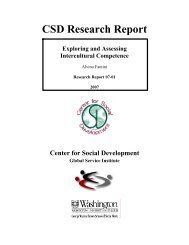Rediscovering social investment in developmental welfare state ...
Rediscovering social investment in developmental welfare state ...
Rediscovering social investment in developmental welfare state ...
Create successful ePaper yourself
Turn your PDF publications into a flip-book with our unique Google optimized e-Paper software.
R E D I S C O V E R I N G S O C I A L I N V E S T M E N T I N D E V E L O P M E N T A L W E L F A R E S T A T E P O L I C I E S :<br />
B A C K T O T H E F U T U R E<br />
synthesis summarized <strong>in</strong> this paper suggests that it is possible to formulate theoretically <strong>in</strong>formed<br />
empirical hypotheses. Several research implications follow from this analysis.<br />
One important research implication related to the policy implications above is the capacity of<br />
<strong>developmental</strong>ist pr<strong>in</strong>ciples and DWSPs to be further revised and expanded to accommodate new<br />
hypotheses about additional <strong>social</strong> policies (e.g., education and healthcare) or other <strong>in</strong>stitutional<br />
features. A second implication of this research is that it po<strong>in</strong>ts to the <strong>in</strong>creas<strong>in</strong>g feasibility of<br />
crossnational comparisons that are theory-driven and predictive, based on improved data. F<strong>in</strong>ally, it<br />
may be especially important for future research to consider the effects of time and the depth and<br />
persistence of poverty, which were not considered <strong>in</strong> this analysis. While dis<strong>in</strong>centive effects (i.e.,<br />
costs may become apparent rather quickly), <strong><strong>in</strong>vestment</strong> effects (i.e., benefits related to cognitive<br />
skills, health, and the like) may accrue over many years. 62<br />
Third, <strong>in</strong> terms of practice, this research compels us to reconsider the focus on the needy and the<br />
preoccupation with <strong>social</strong> control that typically pervades the strengths-based view <strong>in</strong> <strong>social</strong> work<br />
(Gray, 2013). Developmentalist <strong>social</strong> policy encourages us to reemphasize how it is that <strong>social</strong><br />
<strong>in</strong>stitutions structure the environment <strong>in</strong> which human behavior occurs. Many <strong>social</strong> service and<br />
community advocates tend to focus on the most needy (i.e., remediation as opposed to prevention)<br />
and preserv<strong>in</strong>g <strong>in</strong>dividual choice and autonomy through cash and vouchers. Developmentalism<br />
should reignite the debate about what constitutes <strong>social</strong> control and to what extent compulsory<br />
benefits and <strong>in</strong>-k<strong>in</strong>d services guarantee wide-rang<strong>in</strong>g <strong>social</strong> rights rather than merely circumscrib<strong>in</strong>g<br />
<strong>in</strong>dividual prerogatives. 63 F<strong>in</strong>ally, it rem<strong>in</strong>ds us that <strong>social</strong> effort is never strictly about resource<br />
transfers that have no implication for capabilities (<strong>in</strong> Sen‘s terms). 64 All transfers have implications<br />
for participation, access, and the like, just as it is impossible to consider <strong>in</strong>come poverty,<br />
consumption poverty, and <strong>social</strong> exclusion to be mutually exclusive well-be<strong>in</strong>g concepts.<br />
Practitioners should not dismiss or disparage transfers as disproportionately benefit<strong>in</strong>g the middle<br />
class and or privilege participatory policies as uniquely well-suited to the poor.<br />
There are a variety of demographic, fiscal, and <strong>social</strong> pressures fac<strong>in</strong>g modern <strong>welfare</strong> <strong>state</strong>s. The old<br />
assumption of the obvious value of the <strong>welfare</strong> <strong>state</strong> is no longer as widely accepted as it once was.<br />
There is, as reflected <strong>in</strong> the <strong>social</strong> <strong><strong>in</strong>vestment</strong> notion, an emerg<strong>in</strong>g discourse centered on <strong>social</strong><br />
protection as a productive factor. The standard economic view (i.e., that there is an equality-efficiency<br />
tradeoff) prevails. There rema<strong>in</strong>s no clear conceptual framework for th<strong>in</strong>k<strong>in</strong>g about whether and<br />
how <strong>social</strong> policies may be both protective and productive. The purpose of this paper was to show<br />
how <strong>social</strong> development thought, a loose collection of ideas, can be ref<strong>in</strong>ed and re<strong>in</strong>terpreted <strong>in</strong> the<br />
context of comparative <strong>welfare</strong> <strong>state</strong> ideas to help identify types of <strong>social</strong> policy that may have<br />
62 DWSPs could not only m<strong>in</strong>imize future <strong>social</strong> costs but also maximize future <strong>social</strong> benefits by mak<strong>in</strong>g mobility (and<br />
future productivity) a realistic possibility and prevent<strong>in</strong>g the creation of tomorrow‘s precarious worker with lifetime low<br />
wages, poor quality jobs, frequent spells of unemployment, and assistance dependency, all of which impact their own<br />
future prospects. Social policy should be seen <strong>in</strong> the context of the potentially very negative effects of economic<br />
hardship on educational atta<strong>in</strong>ment and subsequent life chances. Eradication of child poverty yields very positive results,<br />
not only <strong>in</strong> terms of alleviat<strong>in</strong>g material hardship <strong>in</strong> childhood but also because economic security is a vital precondition<br />
for later achievement (Kangas & Palme, 2005).<br />
63 It is mislead<strong>in</strong>g to assume that certa<strong>in</strong> types of benefits are <strong>in</strong>herently paternalistic or reflect expressions of <strong>social</strong><br />
control. When they are considered <strong>in</strong>teract<strong>in</strong>g with other elements (e.g., when <strong>in</strong>-k<strong>in</strong>d are comb<strong>in</strong>ed with universal<br />
benefits), paternalism is less of an issue.<br />
64 See Johnson (2014b) for more on the compatibility of <strong>developmental</strong>ist policy with Amartya Sen‘s capability approach.<br />
C E N T E R F O R S O C I A L D E V E L O P M E N T<br />
W A S H I N G T O N U N I V E R S I T Y I N S T . L O U I S<br />
44
















